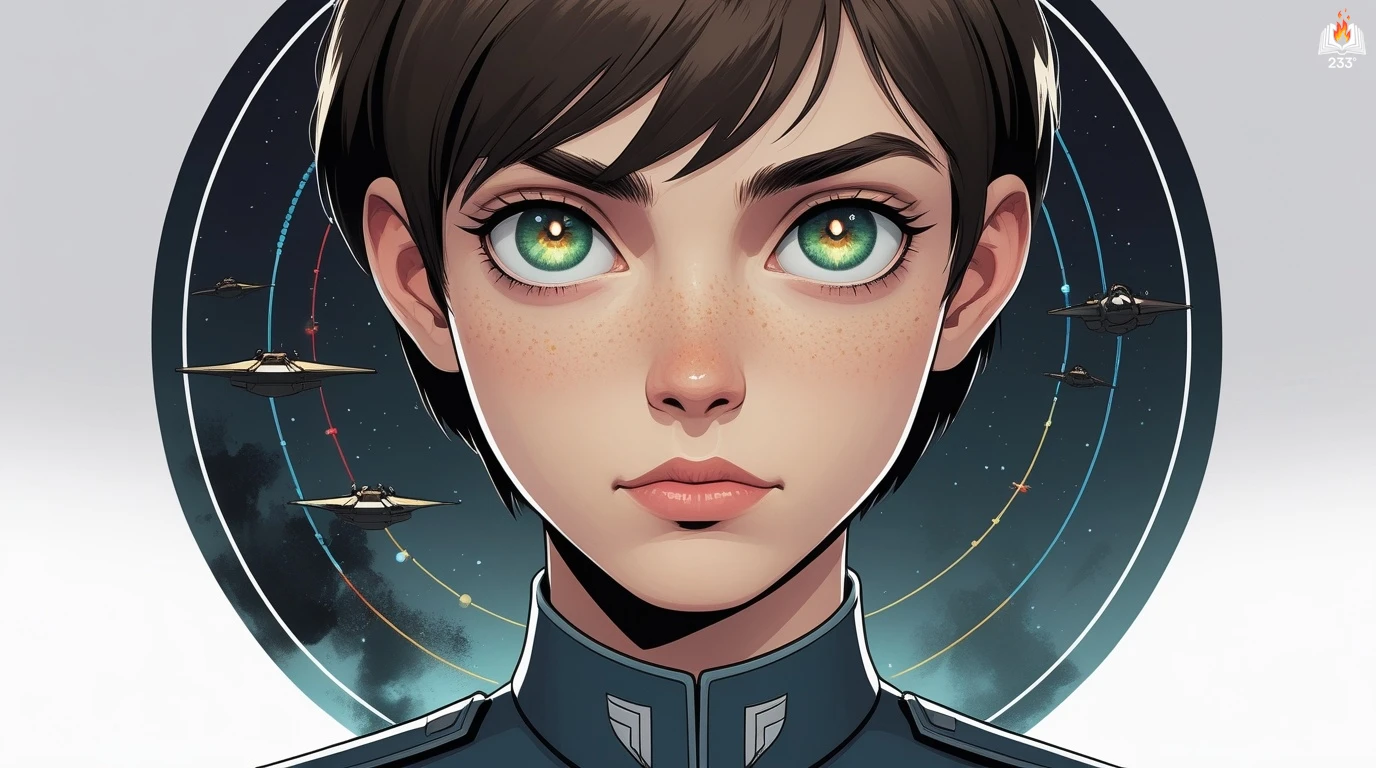Shadow Puppets (2002), by Orson Scott Card, is the third installment in the Ender’s Shadow series, which runs parallel to the famed Ender’s Game series. The novel continues the story of Bean, one of Ender Wiggin’s most brilliant protégés, as he navigates global politics, warfare, and personal dilemmas in the aftermath of humanity’s war with the Formics. As the balance of global power shifts, the novel explores the rise of new threats—especially the manipulative and deadly Achilles—against a backdrop of love, loyalty, and genetic destiny.
Plot Summary
In the tense years after the defeat of the alien Formics, Earth trembles not under the threat of invasion but beneath the weight of its own fragile alliances. In this fractured world, Bean, once Ender Wiggin’s brilliant lieutenant, stands on the cusp of two wars – one waged across nations, the other against his own body. Born of genetic manipulation, Bean’s body grows at an unnatural rate, his towering height a reminder that his life is measured in short years, not decades. Yet even with this shadow, his mind remains sharp, a weapon Peter Wiggin, the young and ruthless Hegemon, is eager to wield.
Peter dreams of uniting the world under a fragile banner of peace, but his methods reek of ambition. To achieve his vision, he plans to free Achilles de Flandres, a murderous genius whose charm hides a reptilian hunger for domination. Achilles had once been a crippled street urchin, but his twisted brilliance led him to orchestrate wars and topple governments. Now imprisoned in China, he is the prize Peter covets, hoping to harness his influence. Bean, recognizing the threat, warns Peter: Achilles cannot be controlled. But ambition blinds the Hegemon, and the operation proceeds.
As helicopters skim across foreign skies, Suriyawong, Bean’s second-in-command, leads the daring mission to extract Achilles. Against his better judgment, Suriyawong allows the monster his freedom, a decision that marks every soldier present with an invisible target. Achilles does not forgive those who have seen him vulnerable. Even as he smiles and plays the grateful guest, his mind sharpens knives in the shadows.
Bean withdraws, his fury boiling beneath his cool exterior. Petra, fierce and loyal, stays at his side, undeterred by his retreat from the battlefield. Together they disappear into the folds of the world, fleeing the widening net Achilles weaves. Petra’s heart beats with stubborn love; she dreams of a future, of children, of family, but Bean holds her at a distance, consumed by the knowledge of his approaching death. His genetic curse – a design meant to birth brilliance – feeds his body’s rapid expansion, leaving his bones fragile and his heart burdened with a deadline.
As Peter tightens his grip on the scattered threads of nations, Achilles spins his own web. With practiced charm, he infiltrates Peter’s circle, seducing those around him into trust while plotting their downfall. Suriyawong, ever vigilant, watches with the wariness of a soldier who has seen too many good men fall. Virlomi, a former Battle School prodigy and Suriyawong’s quiet love, slips away into hiding, knowing Achilles’s vengeance is a slow blade.
Bean and Petra’s journey becomes a restless odyssey across continents, weaving through false identities, slipping through checkpoints, their bond hardening in the forge of survival. Petra challenges Bean’s isolation, his refusal to accept the possibility of life beyond war. In stolen moments under sunlit trees and bustling streets, their laughter bubbles to the surface, clashing against the darkness that follows them. They are hunted not only by Achilles but by the slow ache of knowing that time is not their ally.
Meanwhile, Peter faces the unraveling of his careful plans. His parents, John Paul and Theresa Wiggin, stand as uneasy guardians in Ribeirão Preto, drawn reluctantly into his dangerous game. They recognize the peril Achilles brings, and in the quiet corners of their home, they begin to contemplate unthinkable solutions. If the balance of the world depends on eliminating Achilles, can they carry that weight with their own hands?
As the net tightens, Suriyawong walks a treacherous line, playing the loyal officer while keeping his knife ready. He studies Achilles, searching for the fracture point, aware that one wrong step might doom them all. And Petra, persistent and unwavering, works to pull Bean back toward the world of the living, toward love, toward a future he refuses to claim.
It is in Warsaw, amid autumn leaves and the soft strains of Chopin drifting across a park, that Bean softens. Petra’s hand in his, her lips brushing his cheek, her stubborn laughter – these become the quiet rebellion against death. Yet even as they steal this moment of peace, the war churns on. Achilles’s reach extends beyond borders, infiltrating the military, slipping poison into politics. Those who once survived Battle School now face the battle of adulthood, a war of alliances and assassins, of decisions that shape nations.
Achilles’s presence in Peter’s camp fractures the fragile alliances that once held. Peter, too clever for his own good, finds himself outplayed by the very devil he sought to control. The Hegemon’s grip weakens, and in the shadows, Theresa Wiggin contemplates her own transformation – from mother to assassin. Graff, the old puppeteer of the Formic wars, lingers at the edges, offering cryptic counsel, knowing the weight of sacrifices yet to come.
In the final weave of this tense tapestry, choices emerge sharp as blades. Suriyawong, Petra, Bean – each holds a thread that could snap the noose around Achilles’s neck. But the cost is heavy. Love is no shield, loyalty no armor. As Achilles maneuvers closer to power, as Peter’s house of cards shudders, as Petra and Bean stand poised between life and sacrifice, the world teeters on the edge of a new age.
Underneath it all runs the quiet, beating heart of the tale: the yearning to leave something behind. Petra’s dreams of children, Bean’s fierce protection of life despite his own doom, Peter’s desperate bid for a legacy, Suriyawong’s loyalty, Theresa’s grim resolve – all speak to the hunger for meaning in the face of mortality.
And so, as nations tremble, as lives twist together and apart, the struggle continues – a dance of power, love, betrayal, and redemption, set against the backdrop of a world still healing from old wars while sowing the seeds of new ones.
Main Characters
Bean (Julian Delphiki): A hyper-intelligent and genetically enhanced military strategist, Bean wrestles with the burden of his accelerating physical growth and limited lifespan. Fiercely loyal yet emotionally guarded, Bean navigates his complex relationship with Petra while confronting global conspiracies and personal mortality.
Petra Arkanian: A sharp, determined tactician and former member of Ender’s jeesh, Petra balances her fierce love for Bean with her own ambitions and vulnerabilities. She pushes Bean to confront his emotions, dreams of a future together, and persistently advocates for hope amid war.
Peter Wiggin: Ender’s older brother, now the Hegemon, a cunning and power-driven political figure. Peter’s ambition to unite the world often blinds him to the ethical costs of his decisions, particularly as he manipulates the fate of Achilles and strains his relationships with Bean and others.
Achilles de Flandres: A brilliant but psychopathic antagonist, Achilles is a master manipulator driven by revenge and an insatiable hunger for power. His charm masks deep sociopathy, making him a dangerous player in global politics and a mortal threat to all who’ve known his weaknesses.
Suriyawong: Bean’s loyal second-in-command, a skilled Thai soldier who balances duty with his own moral compass. Suriyawong’s quiet strength and tactical brilliance make him a crucial ally in the fight against Achilles and a steadying force amid chaos.
Sister Carlotta (in memory): Though deceased, Sister Carlotta’s influence as Bean’s rescuer and moral anchor reverberates through his decisions and memories, shaping his ethical framework.
Theme
Power and Corruption: The novel delves into how the pursuit of power, particularly by figures like Peter and Achilles, can lead to moral compromise, betrayal, and destruction. Political ambition becomes a double-edged sword, raising questions about leadership and responsibility.
Genetic Destiny and Identity: Bean’s genetically engineered nature—and his looming, shortened lifespan—forces profound reflections on what it means to be human. The tension between biology and choice shapes his journey and his decisions about love, legacy, and survival.
Loyalty and Betrayal: From friendships forged in Battle School to new alliances and deadly rivalries, the story explores loyalty under pressure. Achilles’s betrayal contrasts with the unwavering bonds between Bean, Petra, and Suriyawong, highlighting the fragility and strength of trust.
Love and Family: Amidst global conflict, Bean and Petra’s evolving romantic relationship offers a tender counterpoint. Their struggle to envision a family, despite Bean’s genetic limitations, underscores the human desire for connection and continuity.
Manipulation and Strategy: The novel is a chessboard of geopolitical maneuvering, with characters constantly plotting and counterplotting. The fine line between manipulation and leadership is tested repeatedly, especially by Peter and Achilles.
Writing Style and Tone
Orson Scott Card’s writing in Shadow Puppets is taut, dialogue-driven, and psychologically rich. He uses tight, economical prose that balances philosophical introspection with the urgency of political intrigue and military action. The frequent use of internal monologue gives readers deep access to characters’ minds, allowing moral dilemmas and emotional conflicts to unfold with nuance and intensity.
Card’s tone oscillates between tense and contemplative, layering moments of sharp suspense with reflections on love, mortality, and loyalty. There’s a sense of underlying melancholy, especially in Bean’s chapters, as he confronts his physical decline and uncertain future. At the same time, Card injects moments of dark humor, banter, and warmth—particularly in Bean and Petra’s interactions—that prevent the novel from becoming oppressively grim. His skillful blending of global-scale conflict with intimate emotional stakes makes the story both thrilling and deeply human.
We hope this summary has sparked your interest and would appreciate you following Celsius 233 on social media:
There’s a treasure trove of other fascinating book summaries waiting for you. Check out our collection of stories that inspire, thrill, and provoke thought, just like this one by checking out the Book Shelf or the Library
Remember, while our summaries capture the essence, they can never replace the full experience of reading the book. If this summary intrigued you, consider diving into the complete story – buy the book and immerse yourself in the author’s original work.
If you want to request a book summary, click here.
When Saurabh is not working/watching football/reading books/traveling, you can reach him via Twitter/X, LinkedIn, or Threads
Restart reading!








